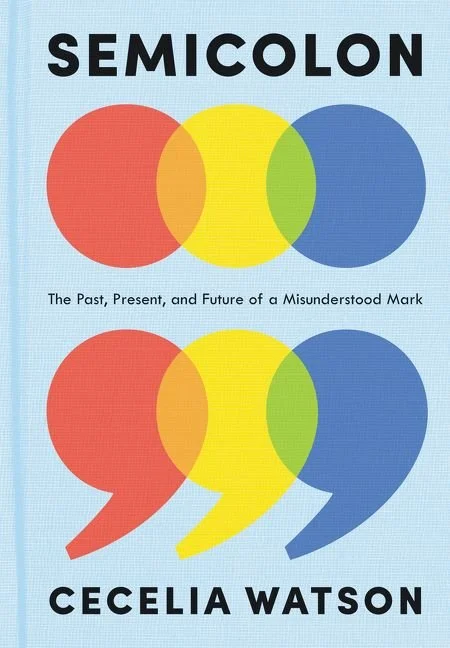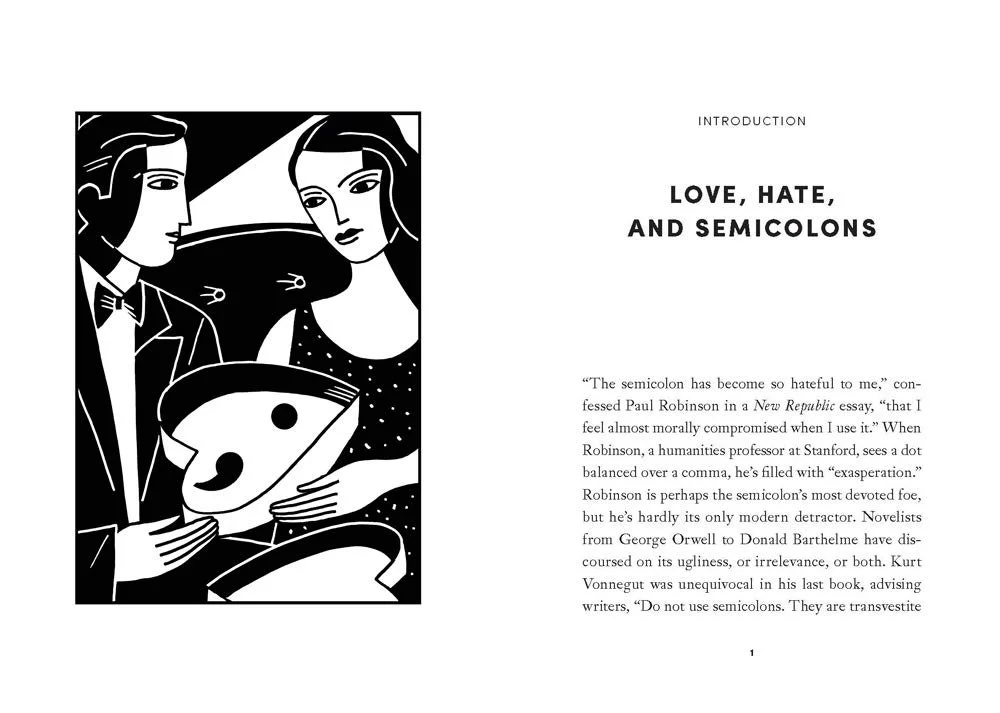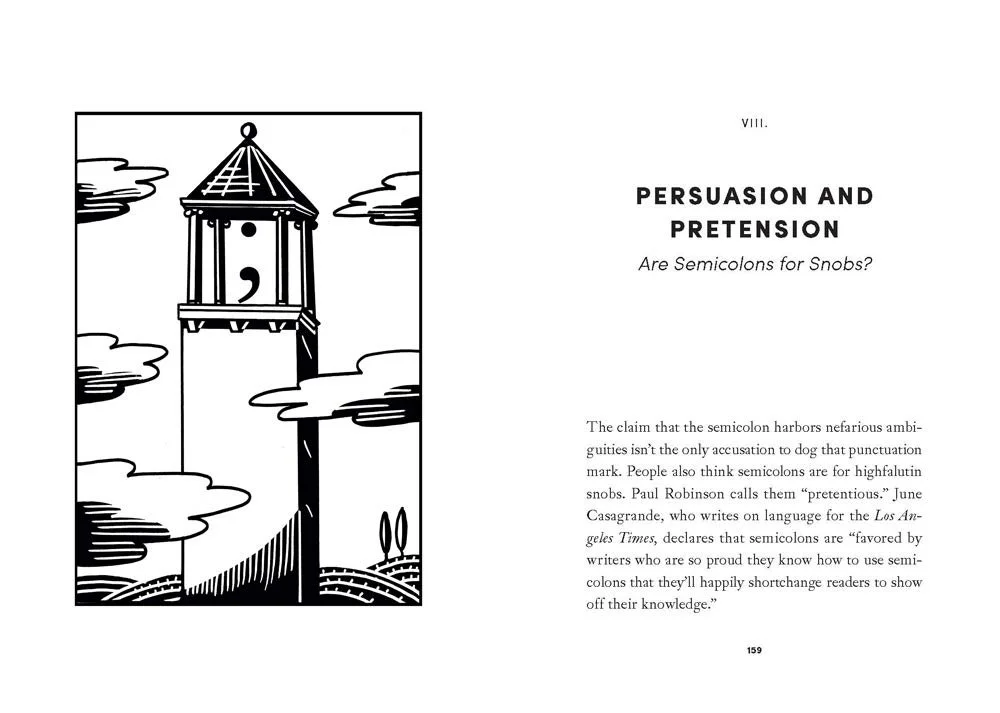Mediocre Pauses; Reviewing ‘Semicolon’ by Cecelia Watson
Semicolon by Cecelia Watson. (Image credits: author website; cover design by Sara Ridky.)
‘[Irvine] Welsh is wrong that thinking about punctuation is ‘nonsense’, but of course he might nonetheless be right that I need to get a fucking life and a proper job.’
~ Cecelia Watson, Semicolon, p.105 footnote
★★☆☆☆ (2 out of 5 stars)
Disappointing. Pick it up if you fancy some fun semicolon-related historical anecdotes, but don’t expect any in depth analysis on the role of punctuation in written language or how and why attitudes about it change.
Introduction to Semicolon, p.1. (Image credits: author website; illustration by Anthony Russo.)
Cecelia Watson’s Semicolon is about the history of the semicolon ( ; ) and its relationship to linguistic prescriptivism. The book goes through the semicolon’s origins in 15th century Venice; 18th and 19th century debates about the correct usage of the English language; how the interpretation of punctuation has real-world consequences, especially in legal contexts; some analyses of semicolons used in literature; and whether semicolons and linguistic prescriptivism are elitist (yes, they are).
It’s a really cool idea for a book – what are some ways in which people have used semicolons, what are people’s attitudes towards it, and what does that all say about how we as a society understand and use language? To answer this, Watson draws on a variety of cool historical sources, which she reproduces in the book. This includes a facsimile of the first Latin text where the semicolon was used, grammar diagrams drawn by 19th century prescriptivists, and excerpts from novels by Raymond Chandler. I enjoyed these, although I don’t think Watson uses them very effectively to illustrate her conclusions.
Watson’s conclusions are (and should be) uncontroversial: the ‘correct use’ of punctuation changes over time; language is too subtle and fluid to be captured by hard-and-fast rules for its use; and linguistic prescriptivism ultimately perpetuates structural inequalities in our society.
Semicolon derives these conclusions from scattergun historical anecdotes and then goes no further. What’s the difference between spoken and written language? What’s the role of punctuation in written language? What would happen if we actually abandoned prescriptivist norms in written language – without a shared linguistic norm, would communication fall apart, or would society really be a better place? What is some current work that is being done to promote more ethical uses of language?
These are all interesting questions that Watson could have asked, but instead popular assumptions about the role of written language and punctuation go unchallenged as Watson rambles on about fights between prescriptivists, debates over the literal interpretation of laws, the verbosity of Henry James and Herman Melville, and the pervasiveness of linguistic discrimination, that one wonders if this needed to be a book about semicolons. It felt like Semicolon wanted to be a book about prescriptivism and linguistic attitudes in general, but its predetermined focus on the semicolon kept dragging it back before Watson’s discussions could go anywhere interesting.
Watson fails at the outset to separate written from spoken language. At one point she says that the semicolon exists in Scots and Scottish Englishes, because Trainspotting by Irvine Welsh uses semicolons – No. Scots and Scottish Englishes are spoken languages, and punctuation cannot exist in spoken languages because they are inherently an orthographic tool for writing. Even when we say things like ‘quote unquote’ we are referencing parts of written language, rather than quote marks existing as part of the speech stream.
She ends the book by concluding that punctuation isn’t actually important, but I don't think she does it for the right reasons. Instead of deconstructing the actual role of punctuation and finding that it contributes nothing to our written language, she concludes punctuation isn’t important because the role of any punctuation mark is partly determined by the text around it, and also because some prominent literary writers have called it unimportant.
When we deconstruct the use of punctuation with the tools of linguistics, we find that punctuation is a complex thing, and that it does contribute to the meaning of a text. Punctuation is an artefact of written language, which is in itself a separate phenomenon from spoken language, even though it is used to record spoken language and extend its functionality. While punctuation probably arose as a way to mark pauses in intonational phrases (as Watson’s book suggests), its function has since then expanded into indicating morphosyntactic boundaries (e.g. full stops after sentences, hyphens to mark compound words like man-made) and also for signposting the flow of information: a colon indicates that the following information will elaborate on the preceding statement; sometimes semicolons separate members of an enumerated list, where the items are given in no particular order; sometimes semicolons link together sentences whose content are related in some way, but not closely enough to be written as one big sentence; brackets mark an aside; an ellipsis suggests that there’s more to the list than stated here … In other words, punctuation helps to elucidate how words and phrases form a coherent stream of information for the reader.
If this is the semiotic framework that semicolons exist in, then 200 pages of prescriptivism anecdotes and literary analysis barely scratch the surface. The semicolon’s use is multi-faceted and ill-understood by the literate public, and it would be interesting to analyse how the semicolon has been used, to see what people have tried to convey with it.
Watson approaches language and punctuation from an ultimately prescriptivist lens: much as she criticises prescriptivism, she never really manages to approach her subject descriptively. She talks about how rules for language use don’t help people understand language any better, and how they perpetuate linguistic discrimination, but it’s all with a fatalistic air of ‘it’s such a shame that prescriptivist rules exist’. But language-users make and uphold the rules, and language-users’ opinions can change the rules. Dismantling generations of linguistic discrimination starts with individuals realising the mutability and arbitrariness of these rules, and even now activists and linguists are working on making language a safer and more inclusive space. So when Watson wistfully concludes that we should build a ‘more functional, more ethical philosophy of punctuation’, without addressing how that might be possible and what that might entail, it rings rather hollow and begs the question What now?
Ch.8 of Semicolon, p.159. (Image credits: author website; illustration by Anthony Russo.)
By this point we’ve probably gathered that Watson isn’t a linguist by training; indeed, her Masters is in Philosophy, and her PhD in the Conceptual and Historical Studies of Science. I’m not saying that only people with linguistics degrees can write about language, but I do think that any critical and in depth analysis of punctuation has to draw on insights from linguistics. Not any specific theories or frameworks, just the way linguists separate actual linguistic phenomena from language-users’ interpretations and impositions. Watson’s written a book about language use without first figuring out why and how language works the way it does.
Even with that aside, I still don’t think Semicolon is a particularly good book. It’s terribly structured. Watson’s main arguments are lost in swathes of stories and asides; the chapters aren’t related to each other in a coherent way; her footnotes range from information that should have been discussed in the main text, to utterly tangential factoids, and to personal anecdotes that make you go ‘oof TMI’.
It becomes increasingly clear that Watson did not have enough material to fill a full-length book, so was seizing on anything she could find to bulk up the text. Which is a shame because she touches on some interesting ideas in the book but refuses to elaborate on them. For example, she mentions in a footnote that Irvine Welsh thinks punctuation is ‘nonsense’. It would be interesting to explore why Welsh, a literary author, might have such an opinion, and why Watson so intuitively and decisively disagrees. Towards the end of the book, Watson brings up how prescriptivist attitudes contributes to existing power structures and frameworks of oppression by discussing a 2001 essay by David Foster Wallace, but it would have been interesting to hear about more recent and more concrete examples of how linguistic standards have been used to justify discrimination, and how activists are working are working against this.
I know Cecelia Watson wrote Semicolon to be a fun pop humanities book, not an academic treatise, but that doesn’t mean Semicolon should be a badly structured book that only engages with its topic on a surface level. A lot of readers and reviewers did really enjoy Semicolon, but that’s not to say they wouldn’t also enjoy a book about the semicolon that is better written and better researched. My thoughts on the book might seem nit-picky, but that’s because I think readers deserve better.


